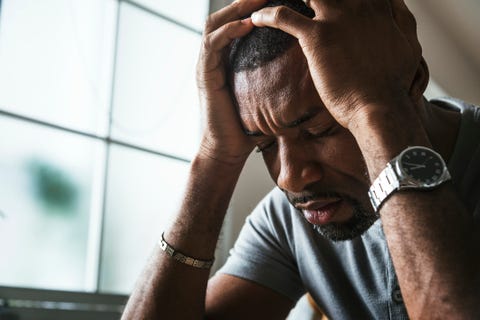Male sex drive: everything you need to know about male libido
It is normal for men to experience a fluctuating sex drive or libido. Find out more about possible causes and treatments.

There are so many misconceptions and myths about the male sex drive. It’s widely thought that men have higher sex drives than women, and that they think about, talk about, and want sex more than women. It’s presumed that a man is always ‘up for it’. These sexist stereotypes are based in a patriarchal notion of sex and are wildly outdated. They harm men, women and people of all genders alike.
It’s important to know that regardless of your gender, it’s normal to experience a fluctuating sex drive or libido – and it’s not always a bad thing. The only time your altered sex drive becomes a problem is if it causes issues with a partner, impacts your sex life, or your mental health.
How common is loss of libido in men?
Clinical psychologist at Between Us premature ejaculation clinic Daniel Sher says loss of libido in men and people with penises is the most frequently reported sexual issue.
‘It’s estimated that 1 in 5 men have a low sex drive, so if you’ve been struggling to get in the mood recently, you’re not alone,’ says Dr Earim Chaudry, medical director at Manual.
Dr Shirin Lakhani, intimate health specialist at Elite Aesthetics and The Cranley Clinic, points to research that suggests about 4 out of 10 men over 45 have low testosterone, and this has been linked to low libido or loss of libido.
Loss of libido causes
There are many reasons a man or person with a penis might experience loss of libido or sex drive, and these can be physical and psychological.
Psychological factors
Depression, stress and anxiety are all common causes for a loss of libido, says Sher. ‘Psychological disorders interrupt communication between the brain and the sex organs,’ he explains. ‘Depression and anxiety alter the way that certain brain chemicals (including dopamine and serotonin) work. Many of these chemicals play an important role in a person’s sex response and their libido can be affected as a result.’
He also says people who have experienced sexual abuse may develop low libido later down the line, ‘especially if they have tried to suppress their traumatic experience’.

Low self-esteem may also lead to a loss of sex drive, especially as a result of sexual performance anxiety, he says.
Other forms of sexual dysfunction, such as premature ejaculation and erectile dysfunction can lead to low libido, Sher says. ‘This often happens when a person’s sexual dysfunction leaves them feeling ashamed and embarrassed. People with low self-esteem are vulnerable in this regard.’
Relationship issues
If there is tension and unresolved conflict in your relationship, this could manifest itself in loss of sex drive. ‘In a sense, low libido is the body’s way of indicating to you that a greater degree of emotional safety and closeness is needed in your relationships,’ Sher explains.
‘Low libido often happens in the context of relationship issues. However, sexual dysfunction can also create relationship problems that did not exist previously.’
Lifestyle factors
Lifestyle factors can also affect your sex drive, says Lakhani. ‘For example, if you’re going through an intensely stressful period then it may decrease, or if you’re exhausted from work or having a young baby.’
Low testosterone levels
‘If your body isn’t producing enough testosterone, whether because of age or other factors, this can leave you with a lower sex drive – as well as other issues such as fatigue, low mood, and reduced muscle mass,’ explains Chaudry.
Diet and alcohol consumption
He says ‘being overweight and unhealthy’ can have an impact on your sexual desire. ‘Too much fatty food and alcohol will have a negative impact on your cardiovascular health, which can increase your chances of suffering from erectile dysfunction and having a low sex drive. In addition, an unhealthy diet can inhibit the success of erectile dysfunction treatments.’
If you suffer from serious conditions like heart disease or diabetes you may also experience loss of libido.
Age
As Lakhani explains, our sex drives fluctuate naturally over time and as we age. ‘A man’s testosterone levels are highest in his late teens, at which time his sex drive should be at its highest too. After this it slowly declines with age.’
The rate at which this declines differs from individual to individual, but she says most men and people with penises retain some of their sex drive into their 60s and 70s.
Loss of libido treatments
Testosterone treatments
If after a consultation with your doctor and a blood test it is confirmed your testosterone levels are too low, testosterone treatment is an option, explains Chaudry. This is known as testosterone replacement therapy.
Lifestyle changes
You can easily make lifestyle changes at home and without a doctor. ‘The road to higher testosterone can start in the kitchen. Regular exercise, eating a nutritious balanced diet is important for your heart health, which supports sexual response. Aim for a diet rich in fruit, veg, and whole grains, low in sugar, and with a moderate amount of lean protein (such as chicken or fish),’ he advises.

Supplements
Chaudry recommends supporting and enhancing your sperm development (as this can play a role in erections) by taking supplements. ‘A daily supplement which is packed with maca, ginseng and zinc may help keep those testosterone levels up.’ Zinc supplementation may help to elevate testosterone levels in those who have a zinc deficiency.
The emotional impact of low libido
As gendered stereotypes have so closely linked sex drives and masculinity, low libido can lead to ‘serious secondary distress’ in men and people with penises, Sher explains. ‘While low libido is often caused by depression, it can also trigger similar psychological disorders, leading to a vicious cycle that can be hard to break free of.’
How to talk to your partner about low libido
If a partner is experience a fluctuating or low sex drive, it can be hard not to take it personally and feel they’re no longer attracted to yo. But Sher is keen to remind people that this isn’t necessarily true – as is clear from the many possible causes.
‘It’s a good idea to interpret this as emotional vulnerability being expressed physically. This gives you an opportunity to look at the bond between yourself and your partner and find ways to create more safety and closeness,’ he says.
‘When discussing this delicate subject, it’s vital that you try to put yourself in your partner’s shoes and try to understand how they feel about the problem. Low libido can have a really negative impact on a relationship, but if you are able to tackle it as a team effort, it can most certainly be overcome.’
As these conversations can very easily become emotional, his advice is to seek the help of a sex therapist who can support you.




